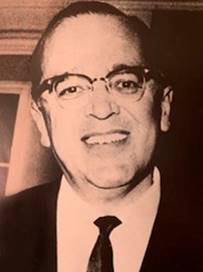The name of the National Gastroenterology Award competition, held every two years, was removed by the decision of the General Meeting in 2022. The reason was probably ignorance of the personality of José Antonio Jácome Valderrama.
One of our responsibilities as spokespersons for the journal and members of our Association is to exalt people who have emerged and left their mark in gastroenterology nationally and internationally. This is an opportunity for new generations to learn who Dr. Jácome Valderrama was and why we thought at some point that our Association’s award should carry his name. Those who don’t know history...
Dr. José Antonio Jácome Valderrama was born in Bucaramanga on February 16, 1915. He studied at the San Pedro Claver School in Centenario Park. He was admitted to the Medicine School of the Universidad Nacional and studied from 1933 to 1939. Later, he interned at the San José and Misericordia hospitals1.
He entered the San Juan de Dios Hospital as an intern in 1939. At the end of 1940, he traveled to Puerto Rico, where he took a course on Hospital Administration. Thus, Dr. Jácome was appointed as a member of the Inter-American Institute of Hospital Administrators. Upon his return, he was named director of the San Juan de Dios hospital, a position he held until 19431,2.
Dr. Jácome organized the first National Congress of Hospital Administration successfully in Bucaramanga. He traveled to New York and joined the General Surgery and Gynecology program at the Polyclinic Medical School and then the Post Graduate Medical School in New York1.
He was later admitted to the Proctology service at Mount Sinai Hospital. Dr. Jácome returned to the country in 1945, passed the teaching competitive examination at the Universidad Nacional, and managed to be part of the surgical clinic chair. He worked alongside figures such as Augusto Pantoja and Pedro E. Cruz3. His article La gastroscopia, a novel diagnostic method he was among the first to introduce in Colombia, dates back to that time1.
He was a gastroenterologist at the Hospital de la Samaritana in 1948 and a founding member of entities such as the Colombian Association of Gastroenterology (July 24, 1947) and the Colombian Medical Federation, in addition to the Colombian College of Surgeons of Colombia (July 1950) and the journal Tribuna Médica1,3.
At the beginning of 1951, President Laureano Gómez appointed him as director of the National Radium Institute. Dr. Jácome attached the Institute to the Ministry of Health and was renamed the National Institute of Cancerology1,2. At the Institute, he organized work by department with an unparalleled archive of medical records, all typewritten. He called on a notable group of specialists from all branches to collaborate with modernizing diagnostic and therapeutic methods. He activated the National Program to Fight Cancer and proposed constructing and providing a six-story building1,3. In 1952, he launched the Radioactive Isotopes Department within the National Institute of Cancerology, starting activities and the Nuclear Medicine specialty in 19551,4.
He was governor of the Colombian chapter of the American College of Surgeons. In 1957, he was Bogotá’s secretary of health and, in 1958, academic dean of the Medicine School of the Universidad Javeriana, where he introduced the American teaching system by creating clinical semester blocks, which improved the quality of teaching in basic sciences1.
In 1959, he was appointed as Minister of Health by President Alberto Lleras Camargo. He promoted the construction of the San Ignacio University Hospital and the journal Universitas Medica, and that same year, he received the “Knight Commander” order1-3. He died of a heart attack in 1966 while preparing a trip to Tokyo at 511,3.











 texto em
texto em 




